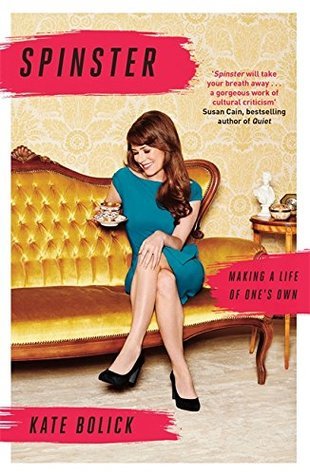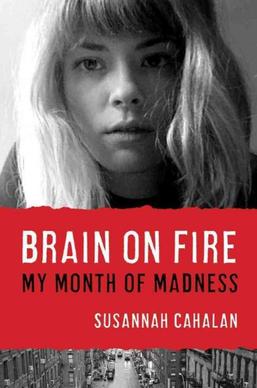We're heading into the start of Dead Week here at the University of Washington, which means buckling down, finishing off those class portfolios, and stapling together that last set of notes. Or, if you're me, working 16 hours a week at the student calling center, having wine-fueled solo X Files nights, and tearing through comic books with the velocity of a speeding bullet. And studying.
At any rate, having Winter Quarter draw to a close has forced me to pay attention to all of the books I've read so far this year... and despite the fact that 16 is not a number to sniff at, it's a little disconcerting that not many of them have showed up so far on this blog!
So, let me catch you up, with a couple of cool non-fiction highly-recommended releases from my 2016 thus far!
Two highly personal accounts from women, talking about subjects that defy norms: a New York Post reporter whose life is thrown into chaos when she develops a debilitating mental illness no one can seem to diagnose; and the chronicles of one serial-single lady's attempts to normalize her lack of relationship status while living and working around the East Coast. Though both of these topics carry their own sets of cultural stigmas, these fearless females speak openly about their experiences.
At any rate, having Winter Quarter draw to a close has forced me to pay attention to all of the books I've read so far this year... and despite the fact that 16 is not a number to sniff at, it's a little disconcerting that not many of them have showed up so far on this blog!
So, let me catch you up, with a couple of cool non-fiction highly-recommended releases from my 2016 thus far!
Two highly personal accounts from women, talking about subjects that defy norms: a New York Post reporter whose life is thrown into chaos when she develops a debilitating mental illness no one can seem to diagnose; and the chronicles of one serial-single lady's attempts to normalize her lack of relationship status while living and working around the East Coast. Though both of these topics carry their own sets of cultural stigmas, these fearless females speak openly about their experiences.
Brain on Fire, Susannah Cahalan
Brain on Fire: My Month of Madness, is a non-fiction account, written by Susannah, about her experiences undergoing a scary and undiagnosable illness, one that manifested itself in bursts of unbidden emotion, and lapses in time and judgement that leave her stunned, reeling, and without control over her own feelings and actions.
It's one thing to go into a book understanding it was an attempt at reconstructing a troublesome time on the behalf of the memoirist, but quite another to be informed, at multiple points towards the end of the first part of the book, that the author cannot hold herself as a reliable resource for translating these events... on the sheer base of the fact that she doesn't remember most of what happened to her, and the parts she does recall, she can't 100% believe to be true. The book is constructed with the help of her family and friends, hospital records, surveillance tapes, and more official documentation of her descent into, as she says in the title, "madness."
Hearing about such an ostracizing experience, in terms of both herself from the world, but even her mind from her body, was a total trip. The fact that it was brought on so suddenly and without warning - as well as that it was left undiagnosed for so long - is truly terrifying to watch play out, even though you knew the book would have a happy ending (it is a memoir, after all!).
Stark and honest in its attempts at reconstructing a half-life, lived through this crippling disease, Cahalan still retains a hopeful and casual tone that make it more accessible to readers. I admired the author's candor and tenacity, and would definitely recommend this book to fans of Sylvia Plath's The Bell Jar.
Spinster, Kate Bolick

Spinster is Kate Bolick's firsthand account of her life as a perpetual single lady - despite having been in several romantic relationships, accounted as well - alongside histories of the famous single ladies she's discovered, through her quest to define female singledom.
T-b-perfectly-h, from the cover of this book, I expected things to be a lot more hip and quirky, more in the style of typical tales of singleness, like Never Have I Ever, from Katie Heaney. And let's face it, when we think about the accounts of a single woman in the city - especially New York City! - there's a couple of TV shows that stick out in our cultural conscience.
In terms of stylistics, Bolick stays very scholarly, very modest, as objective as she can be in accounting her own life. She gives absolute amounts of respect to both her romantic partners, and coupled people in general, while still staying true to her own journey. The book was chock full of statistics and historical perspectives on the lives and livelihood of singlewomen, but preserved plenty of room for Bolick's sense of humor and candor.
Unsurprisingly, I related to this book. As someone who is nearing a jumping-off point in her life - hello, graduation! - it was reassuring to hear one woman's account of personal and professional success, which didn't necessarily coincide with other peoples' definitions of either. I loved looking up each author she mentioned as she was describing their lives and styles, because, let's be real: I have my own set of personal heroes, too. It was interesting getting perspective on someone else's.
Have you read any good non-fiction recently? Have any advice for someone trying to get their work done... or a good book to take my mind of off Finals? Let me know, in the comments below!


No comments:
Post a Comment